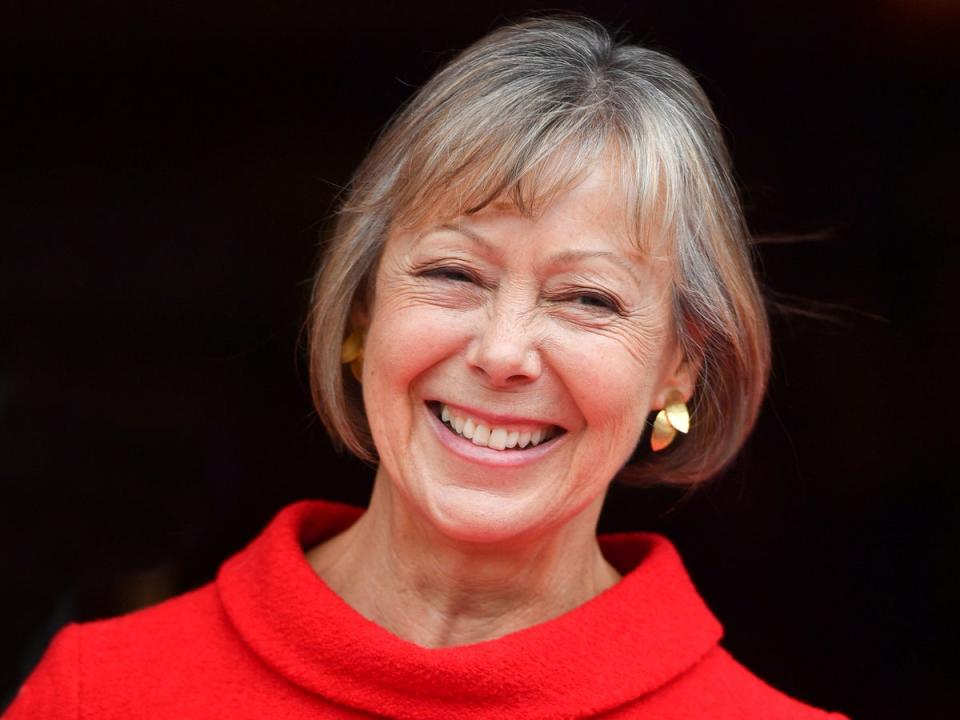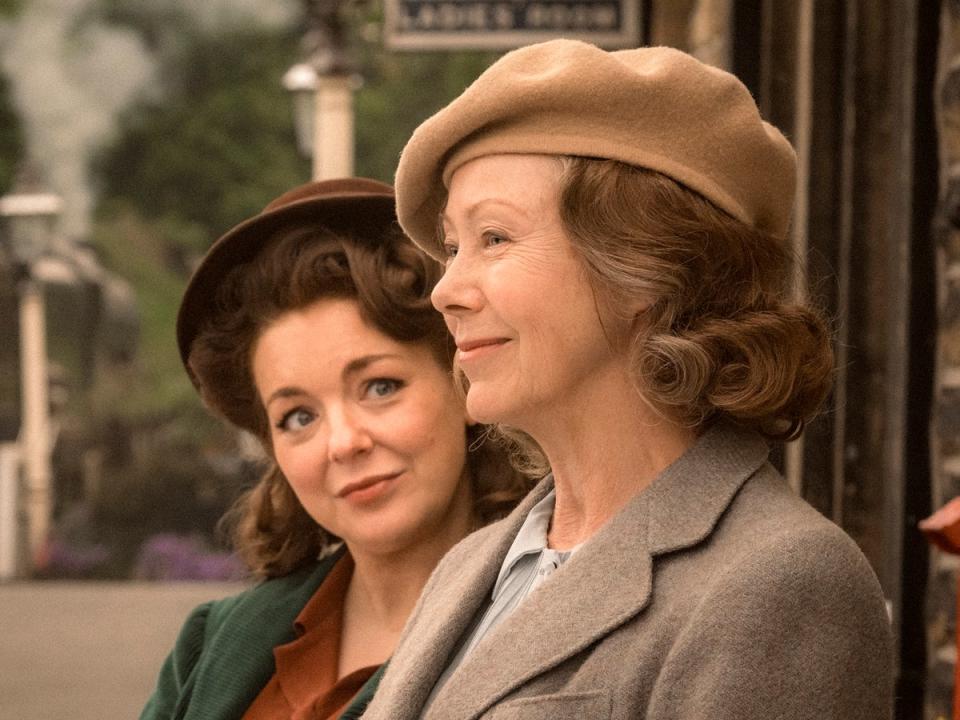Jenny Agutter: ‘I was a 16-year-old and I felt very uncomfortable about being naked’

Jenny Agutter is talking to me about getting naked. “It’s not an issue with me,” says the star of BBC’s Call the Midwife, in her softly spoken cut-glass accent. “The exploitation of it is. You can end up naked in places you don’t want to.” We’ve met up in a London hotel to discuss her new film, the decidedly not X-rated The Railway Children Return, but conversation has veered towards the nude scenes she did as a young actor. Now, she explains, “[these scenes have] ended up out of context” on the internet. “That shocks me. Doing it doesn’t shock me.”
There was the skinny-dipping scene in Nicolas Roeg’s Walkabout (1971), filmed when she was just 16; it turned her into a pin-up, as the teenage girl lost in the Australian outback. Later, she played the sexually provocative twentysomething stable girl Jill Mason in Equus (1977), where she stripped off fully naked for a troubled boy with an unhealthy obsession with horses – a role that earned her a Bafta. And as Nurse Price in the Oscar-winning An American Werewolf in London (1981) – which she once called “perfect fantasy fodder” – she has sex in her shower with the American tourist she’s fallen for, unaware he’s about to turn into a werewolf at the next full moon. The fact these scenes have now been reduced to rogue screengrabs for people’s titillation, she says, makes “my heart sink … It makes it bigger than it is.”
“Walkabout was meant to be innocent,” she says of the arty survival film. Roeg, she claims, went to great lengths to put her at ease and explain his vision of a Garden of Eden. But she admits, with a gulp: “it wasn’t easy”.
“I was a 16-year-old and I felt very uncomfortable about being naked. But they shot from a long way away and I didn’t have anyone around me. And actually, when I did the shot, I got dressed very quickly. It felt very free in the water because you know, I have to tell you, swimming in the water naked is lovely and I still swim in the water naked.”
Agutter, wearing a yellow dress and gold dangly earrings, has a youthful glow at 69. Her wild swimming confession is another indicator that she’s as free-spirited as many of the characters she plays. She lives for most of the year on the Lizard Peninsula in Cornwall with her husband of 31 years, Johan Tham, a Swedish hotelier. The couple have one adult son, Jonathan, who’s a GP in London.
It was in the much-loved 1970 film The Railway Children, based on E Nesbit’s classic novel, that Agutter first truly made her mark at the age of 18. She played Roberta “Bobbie” Waterbury, a role she’s now reprising 52 years later for the sequel. For anybody who hasn’t seen it, she steals the film. In one of its most famous scenes, Bobbie spots her long-lost father through the smoke as the steam train departs Oakworth railway station, and cries out: “Daddy! My Daddy!”. It’s almost impossible not to sob. Now, in the sequel, set in 1944, Bobbie is a grandmother. She’s standing on the exact same platform in Yorkshire – where she had arrived in 1905 as one of the original railway children – excitedly waiting to take in a trio of new arrivals.
Things are different this time. The new children have not been forced to move from London to a dank, rat-infested house by the railway with their strapped-for-cash mother (Dinah Sheridan) following their father’s wrongful arrest, as Bobbie and her siblings were. It’s the Second World War, and Lily, Pattie and Ted are evacuees, fleeing the north of England’s Salford. “Do you remember arriving here?” Bobbie’s grown-up daughter Annie, played by Sheridan Smith, asks. “Like it was yesterday,” smiles Bobbie, with a cheesy, knowing look, in one of many nods to the original.

The Somerset-born Agutter, who was first cast as Bobbie in a BBC mini-series in 1968, and played the role of Bobbie’s mother in an ITV remake in 2000, says that watching the 1970 film is “the same way you might feel if you open an album and saw a picture of yourself as a child”.
She became a child actor at 11 when she was cast in East of Sudan (1964) while boarding at Elmhurst Ballet School in Birmingham; her military parents were in Cyprus on an army base and thought a ballet school seemed fun. She left school aged 16, when she made The Railway Children film. Never one for delving deep into dark, conflicted inner torment onscreen, though, Agutter has a knack for playing pure, good, and kind-hearted innocents – often aloof, but fizzing with sexual intrigue.
There’s the tender Fritha, the orphan girl, wearing a flat cap and black pullover while tending an injured bird in The Snow Goose (1971), who falls for the much older reclusive artist (Richard Harris) – a part for which she won an Emmy – and the sultry and well-meaning Jessica 6, donning transparent green tunics in the sci-fi classic Logan’s Run (1976) as Michael York’s love interest. On TV, she’s goodness personified as the wise and empathetic Sister Julienne in the BBC hit Call the Midwife. It’s a role she’s played in every episode since the show began in 2012, her character having survived the train crash in the series 11 finale earlier this year. She’s now filming the next series.
A producer pointed out that my knees were getting fat
“I was worried that I was going to get killed off,” she says, sounding totally bereft. “I did actually write to the producer and said, ‘What happens next? Am I coming back?’ It was partly tongue-in-cheek but also, ‘Hey, where does this go because it looks like I’m dying?’ We never know the story from one minute to the next.”
She’s strayed from the goody-goody roles a few times: as the hard and cynical M15 traitor Tess in Spooks, or, more uncharacteristically, tackling guards to the floor with fierce kung fu moves in Captain America: The Winter Soldier (2014), when she reprised her World Security Council role from The Avengers.
Agutter moved to Hollywood in 1974 aged 21 – but the stakes weren’t too high. She had just played Miranda in Peter Hall’s production of The Tempest with John Gielgud at the National – a production hailed as “fabulous” according to a review in The Observer. It was a huge achievement – she beat other actors her age to the post who had been trained at drama schools like Rada. Gielgud was so supportive, she says. “If I ever forgot my lines he would say, ‘Don’t worry dear, if I see you are sinking, I will throw you a line.’”

“I had a lot of work already behind me,” she says. “I always knew I could come back to the UK.” She didn’t return for 17 years but did continue to appear in hit British films such as The Eagle Has Landed (1976). In America, she “didn’t belong to Hollywood” but loved the “openness of LA” and “being in the sunshine”.
Did she have any casting couch horror stories, I ask? “Nothing like that. Nothing. I didn’t come across it at all. I may have been very lucky.” She screen-tested for Logan’s Run about six months after moving to the US – the only sexism she experienced was from its producer Saul David. “He pointed out that my knees were getting fat,” she says.
“He was funny and fun to be around. And when I did interviews, he would send cakes to the tables as though I was going to eat masses of stuff. He did make some comment about ‘Be careful about putting on weight’ particularly when I’m talking to journalists about dieting and how I keep fit.”
She brushes it off as him “playing practical jokes”, but there must have been a huge pressure to be thin. “I think there’s pressure on women in film to be young. And that may be an issue rather than the fat-thin issue because we see people of all shapes and sizes. But there is a youth issue. I think that’s beginning to fade, although there is still a desire to get plastic surgery – which isn’t my thing, only because I’m squeamish.”
Ray Stark, the Hollywood producer behind Funny Girl, the riotous 1968 musical that made a star of Barbra Streisand, told Agutter she should have the bags done under her eyes. “I guess I was 23 or 24 years old. Everyone said I should visit Ray Stark – see what he might be up to. Perhaps it was a puffy day,” she says, dabbing under her eyes. “I’m actually pretty puffy today.”
It’s surprising how much younger Agutter looks in the flesh than her character in The Railway Children Return. More than 50 years on, I wonder if she has a message for her younger self who stepped out of the train all those years ago.
“Just open your eyes and look, “she says smiling. “I really didn’t follow through with my education – which was a bit daft. And I think it would have been to say, ‘Don’t worry about that. You get to know things. Just take in everything that’s around you.’ And I think, that’s just what I’ve done.”
‘The Railway Children Return’ is out in cinemas on 15 July

 Yahoo News
Yahoo News 